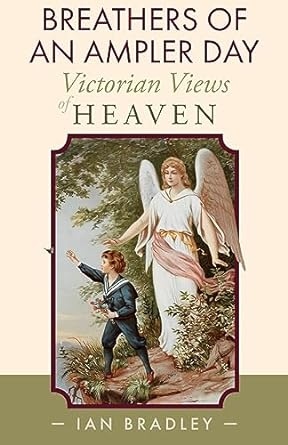Breathers of an Ampler Day by Ian Bradley
Explores 19th century shifts in thinking about heaven, hell and the afterlife, in the belief they may help us in our conversations about dying today
 Breathers of an Ampler Day: Victorian views of Heaven
Breathers of an Ampler Day: Victorian views of Heaven
By Ian Bradley
Sacristy Press
ISBN 978 1 529 78959 306 8
Reviewed by Stephen Copson
Death and dying are universal human experiences. Every civilisation, every religion has to deal with the reality. Ian Bradley surveys some changes in attitudes to death and the afterlife that were apparent in Victorian Britain.
He is an accomplished writer on the 19th century and on hymnody. Belief in Hell, he suggests, was diminishing in the public mind at the thought of a deity willing to condemn the vast majority of humanity to endless torment (although F D Maurice still lost his University chair for questioning the doctrine).
People did not have to be frightened into Heaven. Immortality of the soul was favoured over bodily resurrection – Plato over Paul. Heaven took a higher profile even though scripture references are far from definitive but it was no longer a physical location ('up there') rather a state of being. The focus shifted from a place with perpetual worship of God by the saints, to a sociable existence where people could look forward to seeing friends and relatives again, who were waiting for them 'on the other side'.
To explore these shifts, he introduces a selection of writers, poets, hymnwriters and theologians – Tennyson, Christina Rossetti, Adelaide Anne Procter, Maurice among them - who pushed the accepted boundaries. 'There is a happy land far, far away', 'O love that wilt not let me go', and 'In Memoriam' are all indicators of changing views of the possibilities of the afterlife. And Heaven might just start here on earth. Perhaps there was a 'greater hope' with its undertones of universalism. The ethos was one of uplift and comforting hope rather than potential doom and irredeemable loss.
Although dying was a constant presence in Victorian England, previous generations had also seen high mortality rates, especially among children and women in childbirth. Perhaps we might say people had been helped to face this reality by the understanding of limbo and purgatory, but the Protestant Reformation had removed this solace.
The writers cited largely come from the Anglican broad church ranks. Bradley underplays the threat of Hell that was more prevalent in the evangelical sections of the Church (although he does discuss Cardinal Newman’s more conservative views and The Dream of Gerontius familiar to many through Elgar’s setting). . In that sense the writers are not representative of movements but of ideas which began to seep into people’s consciousness. And Tennyson (quoted in the title) and Procter (she published numerous poems in Dickens’ Household Words) were hugely influential at the time as people explored fresh understandings. This is the obverse of the Victorian crisis of faith; it is the Victorian search for new assurance.
Bradley asserts how dying has become distanced from most people in contemporary Western living, a private affair. Most people do not die at home, many have no physical grave marker. Life expectancy is higher and childbirth less dangerous. Medicine sees death as the final frontier and fortunes are spent trying to extend living. Yet he points out how Covid could break this consensus. Bradley wants people to be more willing to address the taboo of dying, and applauds the opportunity of Death Café discussions.
This is not an encyclopaedic work about Heaven or death or dying, nor is it intended to be. But Bradley does offer sufficient clues in this slim volume to acknowledge that much of what is often taken for common and unchanging currency, in church and without, in fact started in the 19th century as new ways of thinking when old certainties were found wanting.
People now can put their faith in any one of a number of belief systems for what happens after death - to name a few, types of resurrection, reincarnation, Paradise, the path toward Nirvana and well, just .... nothing. What do Christians have to say about dying, death and Heaven? This is both a theological question and pastoral concern - what do we say when someone dies, what do we preach at a funeral service and how do we comfort and support the living at a time of grief and loss?
Stephen Copson is a former regional minister with the Central Baptist Association
Baptist Times, 21/06/2024